May 29, 2025 | 16:01 GMT +7
May 29, 2025 | 16:01 GMT +7
Hotline: 0913.378.918
May 29, 2025 | 16:01 GMT +7
Hotline: 0913.378.918
Pham Dang Dai of Nghia Lo commune, Yen Bai, discovered the macadamia tree by accidentally in 2015 while visiting a friend in Lam Dong province. As a result of observing the high economic efficiency, he decided to purchase 300 seedlings at 120,000 VND per tree for concentrated planting at home. The macadamia tree took root and flourished, producing more than 3 quintals of fruit until 2018.
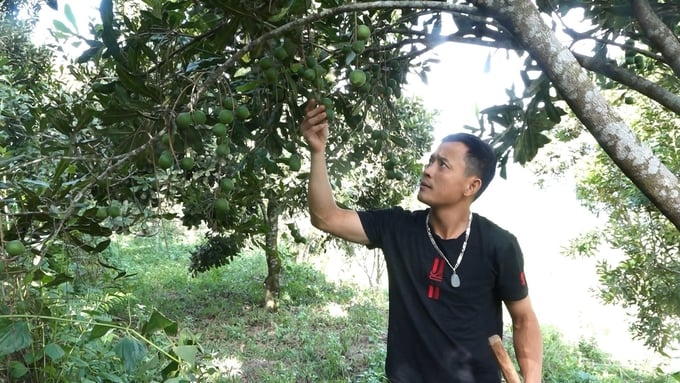
Mr. Pham Dang Dai's macadamia orchard in Nghia Lo town has harvested tons of fruit every year. Photo: Thanh Tien.
He stated that the entire harvest was devoted to domestic consumption and seedling incubation for neighborhood sale. In 2022, the area of his macadamia trees produced more than 4 tons of fresh fruits or 2 tons of dry nuts after being peeled and dried, resulting in a profit of more than 200 million VND. Currently, his family is adding 600 trees to the garden, bringing the total macadamia area to 3 hectares. In addition, he established an incubator garden to supply seedlings.
Dien Duc Thang in the Van Chan district of Yen Bai began macadamia cultivation in 2020 with 170 trees intercropped with tea plants on an area of 1.5 hectares. Each seedling is worth 75,000 VND, including the district's contribution of 50,000 VND. All macadamia trees are presently expanding poorly and beginning to bloom. However, Thang has not yet harvested crops to promote tree growth. When the model demonstrates economic viability, he will expand the area.
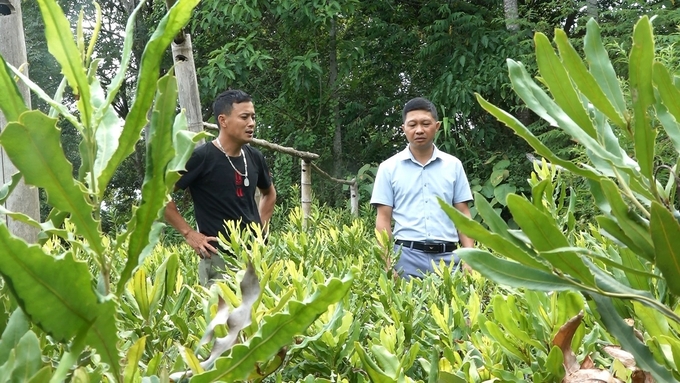
Mr. Pham Dang Dai in Nghia Lo town has built a nursery of macadamia seedlings to sell to people. Photo: Thanh Tien.
Van Chan district is the largest macadamia planting area in Yen Bai province, covering 320 hectares, of which 316 ha are intercropped with tea trees at a density of 110 trees/ha and 6 ha are planted with a density of 280-300 trees/ha. Macadamia trees were planted in Van Chan in 2021, with the district providing 50,000 VND per seedling to new planting households in Gia Hoi, Nam Bung, Lien Son Farm town, and other communes in the planning area.
Mr. Pham Nguyen Binh, the head of the Agriculture and Rural Development Department of Van Chan district, stated that based on the assessment and actual survey of a few individual models planted in the district, macadamia trees are suitable for the soil and climate conditions of the region, can be intercropped with tea trees, and can be planted solely on inefficient production forest land.
According to the district of Van Chan's initiative for producing macadamia nuts with tea, it is anticipated that by the end of 2023, 400 hectares will be cultivated in five communes and cities, including Nam Bung, Gia Hoi, Dong Khe, Lien Son Farm town, and Son Thinh town. Each household that participates in the initiative will receive 50,000 Vietnamese Dong per seedling.
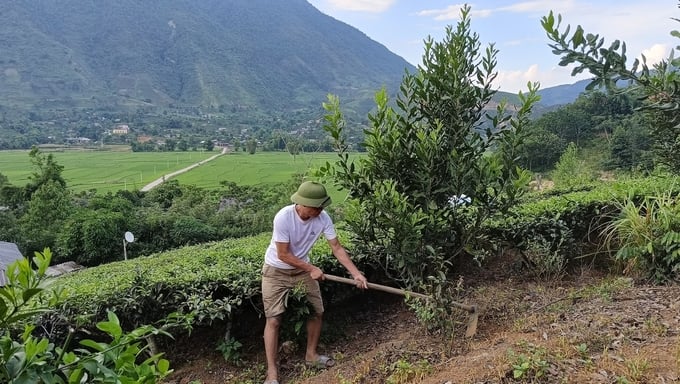
Anh Điền Đức Thắng ở xã Gia Hội, huyện Văn Chấn chăm sóc diện tích mắc ca trồng xen chè. Ảnh: Thanh Tiến.
Van Chan district has established a steering committee to implement the project, conduct training, transfer science and technology, and directly guide participating households; control seed sources to ensure clear origin and quality according to technical process; check the standard area, check and accept the stages from soil preparation, tilling, digging holes, planting, and checking and accepting the survival rate...
In the past, the Vietnam Macadamia Association has collaborated with the Van Chan district to provide training on the cultivation, care, harvesting, and processing of macadamia berries, as well as local surveys.
People have been planting macadamia trees in Yen Bai province on their own since 2011. Since 2018, residents in the districts of Luc Yen, Tran Yen, and Van Chan have spontaneously planted macadamia trees on home garden and forest land. However, this is a novel commodity for the province of Yen Bai that has not been thoroughly monitored and evaluated by professional institutions.
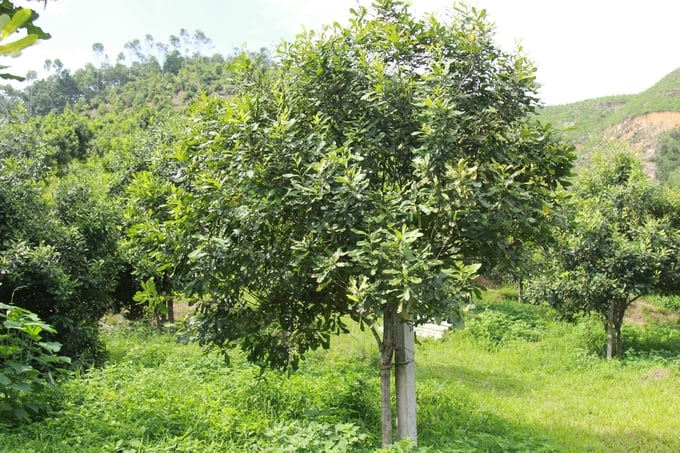
In Van Chan district, there are over 316ha of macadamia trees intercropped on tea hills. Photo: Thanh Tien.
According to the Yen Bai Forest Protection Department, the province of Yen Bai contains more than 380ha of macadamia trees, which are both concentrated and distributed on forest land. The concentrated cultivation area is roughly 65ha (concentrated mostly in the districts of Tran Yen and Van Chan) and the tea intercropping area is 316ha (concentrated primarily in the district of Van Chan). A variety of tiny agricultural regions may also be found in the districts of Luc Yen, Mu Cang Chai, and Nghia Lo town.
The bulk of macadamia trees in the province of Yen Bai are now between 1 and 4 years old, resulting in a poor yield. Macadamia nut output is expected to reach about 10 tons of raw produce in 2022.
Mr. Nguyen Thai Binh, Deputy Director of Yen Bai Province's Department of Agriculture and Rural Development, stated that because macadamia is a new crop for Yen Bai province, the province's agricultural sector is extremely cautious, with a policy of "slow but sure," developing methodically and scientifically on the basis of investigation, evaluation, testing...
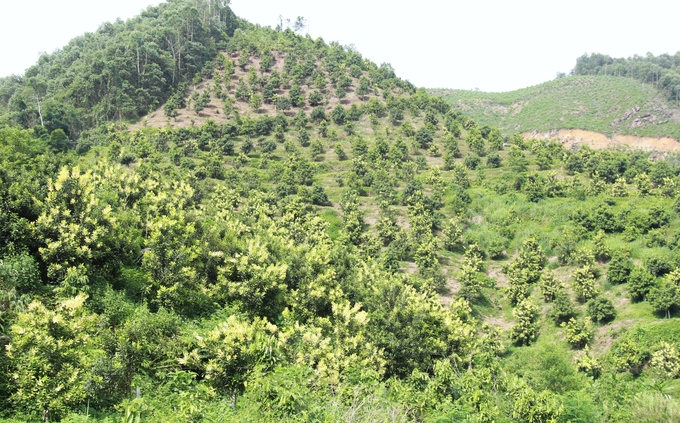
Currently, Yen Bai has about 380ha of macadamia, which is concentrated and intercropped with other crops. Photo: Thanh Tien.
Initially, well-growing macadamia trees in several province areas were studied. However, because the bulk of macadamia land has not yet been harvested, yield, stability, and economic efficacy cannot be precisely determined. As a result, provincial agencies and district departments will continue to monitor locations where people have spontaneously planted crops in order to painstakingly analyze production, stability, and economic efficiency, as well as environmental protection issues, in the future...
There are presently no preliminary processing and processing facilities in Yen Bai due to the province's poor macadamia nut yield. The gathered items are sold to a few small merchants.
In 2021, the People's Committee of Yen Bai province ordered the Forest Protection Department to test macadamia trees in the province's western districts to assess their growth and development potential for precautionary measures. The trial models were planted using pure planting and intercropping on tea slopes in Van Chan, Tram Tau, and Mu Cang Chai, comprising 12ha and ten families.
At the start of the garden, the Yen Bai Forest Protection Department trained more than 400 farmer households and local officials on macadamia trees, their socio-economic and environmental benefits, and their limitations and challenges.
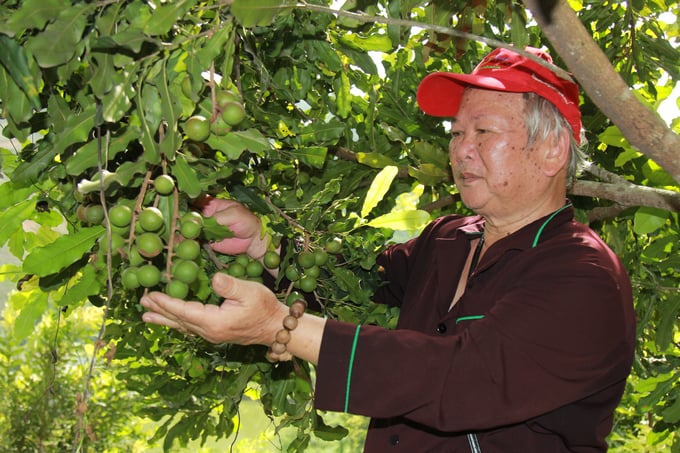
Currently, some macadamia acreage planted by people in Yen Bai has had fruit and has a high yield, however, the agricultural sector of this province has advised farmers not to spontaneously expand the area. Photo: Thanh Tien.
The Van Chan People's Committee is growing macadamia trees and doing scientific research. Yen Bai will produce macadamia tree development guidelines after implementing projects in 2020-2023 and completely reviewing and appraising the situation.
Mr. Nguyen The Phuoc, Standing Vice Chairman of Yen Bai Provincial People's Committee, recently told the Vietnam Macadamia Association that Yen Bai supports growing macadamia trees in the region by selecting suitable varieties, ensuring efficiency, quality, value chain development, and stable and sustainable development.
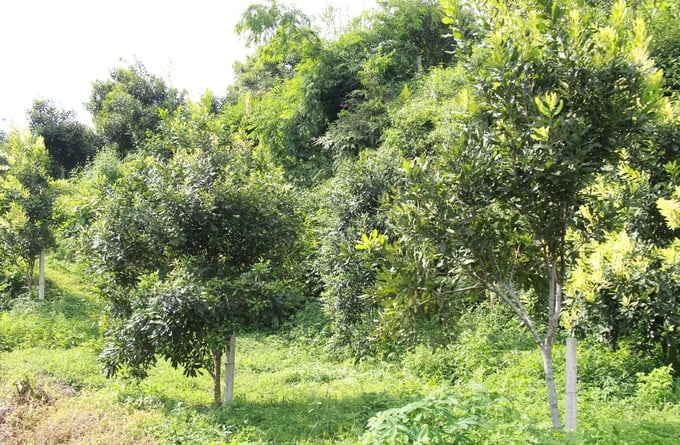
Yen Bai province will closely monitor the development of macadamia trees to have a policy to expand the appropriate area. Photo: Thanh Tien.
Thus, the Vietnam Macadamia Association should continue to coordinate and support the development of macadamia trees in Yen Bai province, working with departments, branches, and localities to survey and determine the location, scale, and planting area that meets their ecological needs.
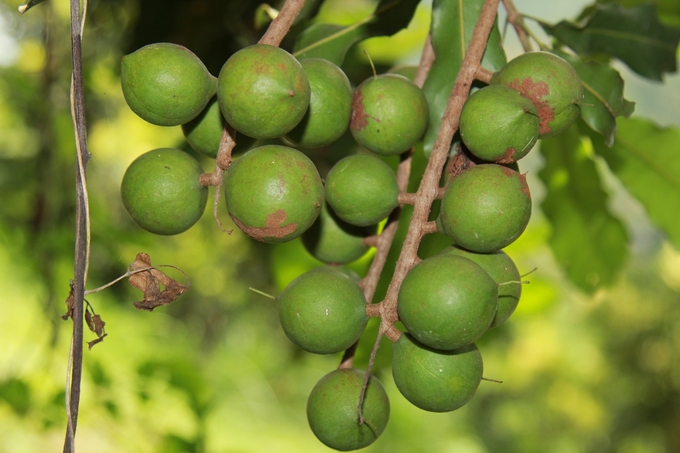
Yen Bai province will continue to survey and determine the location, scale and planting area in accordance with ecological requirements of macadamia trees. Photo: Thanh Tien.
Maintain experimental and established agricultural models in Tran Yen, Luc Yen, Van Chan, and Van Yen districts. Introduce Vietnam Macadamia Association member enterprises to invest in value chain models for macadamia tree development in the province, macadamia lines suitable for each climatic sub-region, and quality-assured seed production facilities.
Translated by Linh Linh
/2025/05/25/4127-3-073637_820.jpg)
(VAN) Thanks to the promotion from an FAO-implemented project, vegetable production in greenhouses in Moc Chau has seen strong development, from 1.5 hectares in 2021 to nearly 50 hectares in 2024.

(VAN) FAO has recently supported USD 140,000 to implement the project 'Risk mitigation human-animal interface risks through disease control initiatives in pig farming.'

(VAN) The People's Committee of Tra Vinh province has approved an adjustment to the investment policy for the Green Hydrogen Plant project, increasing its area to approximately 52.76 hectares.
![Reducing emissions from rice fields: [2] Farmers’ commitment to the soil](https://t.ex-cdn.com/nongnghiepmoitruong.vn/608w/files/news/2025/05/05/dsc08881jpg-nongnghiep-140632.jpg)
(VAN) Clean rice cultivation model in Thuong Tan commune, Bac Tan Uyen district, is assisting local residents in achieving sustainable agriculture by substantially reducing costs, increasing productivity, and protecting the environment.

(VAN) At the conference to disseminate Resolution No. 68, AgriS introduced its digital agricultural ecosystem and reaffirmed its commitment to accompanying the Government in promoting private sector development and sustainable agriculture.

(VAN) 'Blue Ocean - Blue Foods' initiative is designed to restore marine ecosystems and establish sustainable livelihoods for local communities by cultivating a minimum of 1,000 hectares of cottonii seaweed in the first three years.
/2025/05/21/4642-3-112707_603.jpg)
(VAN) The V-SCOPE project has made direct contributions to three out of six pillars of the Comprehensive Strategic Partnership between Vietnam and Australia.